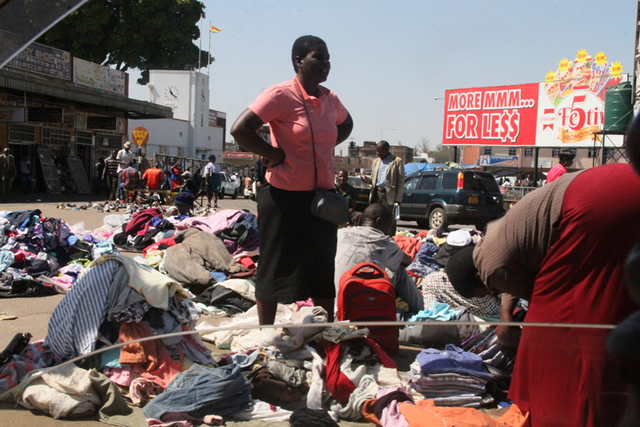Vending shelters: White elephants?

Fortious Nhambura
In the past, shouts of vendors selling their wares were only common in the high density residential areas. Carrying sacks containing sweeping brooms, homemade floor polish, reed mats, scouring powder or toilet cleaners, the vendors became a wake up call for many people in the western suburbs of Harare.
Mbare Musika was another haven of vendors though they used to fight running battles with municipal police as vending was illegal.
At first vending was a trade for the poor and uneducated. It took courage to take up vending.
Only those who had failed to secure formal employment took up vending.
That was life back then.
The downturn in economic performance in the late 1990s and the economic sanctions that followed the commencement of the land reform programme have forced many into vending.
Vending became the in-thing with even the gainfully employed looking for something to sell to augment their incomes.
With time, vendors moved into Harare’s central business district, starting downtown and later the city centre, where they offloaded their wares onto the pavements.
The CBD changed as the pavements became smaller, dirty and crowded. Every street is now occupied by vendors selling tomatoes, sweets, earrings, bangles, shoes, sandals, rat and cockroach pesticides among many others.
Businesspeople, pedestrians and motorists have complained.
The city authorities responded. First, they opened some areas as vending sites where individual flea market operators pay $2 daily for trading space while fruit and vegetable traders pay $1 daily. Still the city remains congested.
Secondly, the city embarked on the construction of vending shelters in designated parts of the city.
One such structure is being built in Mbare’s National section. Vendors are expected to be accommodated there and move out of the city centre.
But the question is, is the construction of vending shelter the panacea to Harare’s congestion?
Vendors say they are comfortable doing business in the city centre where there is a ready market and not in the areas outside the city centre.
Mary Mapfumo (22) says she wants to be located where there is a market and that can only be in the city centre.
“I want to fend for my family; council wants to keep Harare free of people like us. The only way is to create a cheap stall in the city centre for vendors.
“We are trading in small items and our returns are small and that makes it almost impossible to pay the rentals demanded of us from council. I am sure these shelters will become white elephants as no one is willing to be taken off the market in the name of bringing sanity to CBD. I have to survive and my survival is on the streets of Harare,” she said.
Another vendor, Maxwell Jaricha of Mabvuku, said it was unfortunate that Harare City Council had not consulted the vendors on the siting of vending shelters.
“In the past it was easy to put vending sites outside the CBD but times have moved and it’s no longer profitable to relocate to Mbare and other suburbs. Business is now in town and that is why I moved to sell my second-hand clothes in the city.
“I am not going back to Mabvuku where my earnings will plummet.
“The city centre is where people meet. Here my clientele is diversified and bigger. I am likely to get someone from Kuwadzana, Budiriro or Mutare buy my wares unlike in Mabvuku where I have to deal with the local people only,” he said.
National Vendors Union of Zimbabwe president Mr Stanely Zvorwadza said construction of vending shelters was no panacea to decongestion of Harare city.
He said the city council must come up with an all-stakeholder driven programme that would ensure that both vendors and the city authorities get the best results.
“It’s unfortunate that as an association representing vendors we were not consulted. Had we been consulted we would have put in our reservations and a better site found. That market shelter could be a waste of resources and is no reprieve to congestion in the city. That site along Simon Mazorodze will not find takers as it is far from the city centre. What has brought vendors into the city is actually the market and trying to take them out the CBD will be futile,” he said.
The NAVUZ president said vendors would not relocate there as it meant increasing their overheads through rentals and transport costs.
“We want to cooperate with council and cooperate in decongesting the city but they seem unwilling. The country should not be looking at making money from vendors as we get small margins from our work. Relocating to centres outside the capital will be unprofitable. That site is ill-advised and has even been condemned by those in the upper end of the small and medium enterprises sector.
“It would have been acceptable if the shelters were located close to the city so that people can walk to buy household wares before boarding kombis home,” he said.
Mr Zworwadza said the most ideal place for siting vending shelters should have been the civic centre grounds as they are not only near to the city but conveniently located as the majority of Harare’s commuters either use the Copacabana, Charge Office or Market Square terminus.
“Those stalls are easy to market and most acceptable to vendors because of their proximity to town. The shelters could then be divided into sections according to the wares the vendors would be selling otherwise the chaos would continue. For instance, people should know where to go if they want cell phones and their accessories, vegetables and foodstuffs or clothing.
It is easy to accommodate vendors in the city without causing congestion. Council must know that proper siting of market shelters will improve revenue for the city and hence the need to involve stakeholders.
Vendors are willing to pay but they cannot pay when they are not sheltered. Of the estimated 100 000 vendors operating in Harare only 6 000 are paying to city council as most are operating from undesignated spaces.
“I am sure properly located vending shelters can be popularised the same manner Mupedzanhamo has become in Harare. Harare can accommodate all the vendors without problems if it copies the model of India that has managed to incorporate the SMEs sector into its economy,” he said.
City of Harare spokesperson Mr Michael Chideme, however, dismissed the fears that the shelters would take vendors out of the market saying they would create an orderly and clean environment that would attract more people to the stalls.
“The relocation of the informal sector to designated sites is a process that requires the buy-in of all stakeholders. The city is engaging all stakeholders to ensure a smooth transition from the present to the ideal.
“In fact the city is in partnership with investors to build new market stalls in Mbare and each of the two to house over 12 000 vending tables. Our consultations note that the informal sector requires decent and sheltered sites to do business.
“The shelters are not taking the vendors from the market but are actually creating a conducive market that attracts the market through order and cleanliness,” he said.
Town Planner Mr Percy Toriro said recently while vending exists in every city in the world, the only thing that differs was how it is planned, conducted and managed.
He added that provision of space for vendors was a critical component in resolving Harare congestion.
“It is also about appropriate sites. We have seen many vending stalls that are underutilised because of poor siting. But it can also be an attitude issue where the vendors do not realise that new markets can be created.
“Authorities need not provide everything themselves. They can just provide space and ask the private sector or other interested organisations to come and develop the spaces to acceptable standards,” he added.
“In such cases, it is important to also build the business capacity of vendors so that they see themselves as entrepreneurs rather than just poor people,” he suggested.
Feedback to [email protected]







Comments